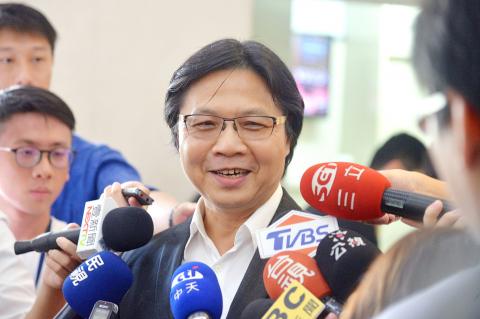China’s apparent manipulation of organized crime groups in Taiwan will not be tolerated, Minister of the Interior Yeh Jiunn-rong (葉俊榮) said yesterday.
“The government will not tolerate such manipulation and the infiltration of Taiwan’s democratic society from abroad. We are resolved to take action and face the problem, and will conduct a full and in-depth investigation,” Yeh said during a plenary session at the Legislative Yuan in Taipei.
“We are a nation based on the legal framework of our Constitution, and the people have strong faith in our democratic institutions. Therefore, we must deal with this matter in a serious manner, fully investigate it and take up measures to counter it,” he added.

Photo: CNA
Yeh’s remarks followed a report yesterday by the Chinese-language Liberty Times (the sister newspaper of the Taipei Times), which suggested that the Chinese Ministry of State Security has been operating an “external liaison office” in Xiamen, China, that communicates with and provides financial assistance to organized crime groups in Taiwan.
Citing sources in the nation’s intelligence agencies, the Liberty Times said that the external liaison office is nominally an organization at the provincial level under China’s Taiwan Affairs Office that handles cross-strait exchange programs, but is in reality an intelligence operations center for political warfare, covert espionage activities and related “united front” work against Taiwan.
As the local unit of the Chinese ministry, it is mainly tasked with monitoring Taiwanese organized crime groups that have business and other activities in China, with the aim of recruiting and manipulating the groups into working for Beijing, the report said.
The external liaison office has successfully built up a good working relationship with Taiwan’s Bamboo Union and the Four Seas Gang, whose members receive funding to do Beijing’s bidding, the report added.
Senior members of the two groups who ran afoul of the law and fled to China to establish businesses or operate in the underground economy became easy targets for recruitment by Chinese intelligence agencies, as they had to collude with local officials to be able to operate and receive forms of political and police protection, the report said.
New Power Party Legislator Hsu Yung-ming (徐永明) yesterday urged the government to get a handle on the situation and determine if the Chinese government had a direct hand in attacks on university students by members of the Chinese Unity Promotion Party (CUPP) at a music festival in Taipei on Sunday.
“Shanghai Municipal Taiwan Affairs Office Director Li Wenhui (李文輝) was at the ‘Sing! China: Shanghai-Taipei Music Festival.’ We must find out if he played a role in the violence by CUPP members against students,” Hsu said.
“We know CUPP Chairman Chang An-le (張安樂) is a gang boss and that he has close links to Chinese authorities,” Hsu said. “It looks like red [China] and black [organized crime organizations] are joining forces against Taiwan.”
“It is also important to find out if these criminal gangs and the CUPP are receiving large sums of money from China to finance their activities in Taiwan,” he added.

AGING: As of last month, people aged 65 or older accounted for 20.06 percent of the total population and the number of couples who got married fell by 18,685 from 2024 Taiwan has surpassed South Korea as the country least willing to have children, with an annual crude birthrate of 4.62 per 1,000 people, Ministry of the Interior data showed yesterday. The nation was previously ranked the second-lowest country in terms of total fertility rate, or the average number of children a woman has in her lifetime. However, South Korea’s fertility rate began to recover from 2023, with total fertility rate rising from 0.72 and estimated to reach 0.82 to 0.85 by last year, and the crude birthrate projected at 6.7 per 1,000 people. Japan’s crude birthrate was projected to fall below six,

US President Donald Trump in an interview with the New York Times published on Thursday said that “it’s up to” Chinese President Xi Jinping (習近平) what China does on Taiwan, but that he would be “very unhappy” with a change in the “status quo.” “He [Xi] considers it to be a part of China, and that’s up to him what he’s going to be doing, but I’ve expressed to him that I would be very unhappy if he did that, and I don’t think he’ll do that. I hope he doesn’t do that,” Trump said. Trump made the comments in the context

SELF-DEFENSE: Tokyo has accelerated its spending goal and its defense minister said the nation needs to discuss whether it should develop nuclear-powered submarines China is ramping up objections to what it sees as Japan’s desire to acquire nuclear weapons, despite Tokyo’s longstanding renunciation of such arms, deepening another fissure in the two neighbors’ increasingly tense ties. In what appears to be a concerted effort, China’s foreign and defense ministries issued statements on Thursday condemning alleged remilitarism efforts by Tokyo. The remarks came as two of the country’s top think tanks jointly issued a 29-page report framing actions by “right-wing forces” in Japan as posing a “serious threat” to world peace. While that report did not define “right-wing forces,” the Chinese Ministry of Foreign Affairs was

PREPAREDNESS: Given the difficulty of importing ammunition during wartime, the Ministry of National Defense said it would prioritize ‘coproduction’ partnerships A newly formed unit of the Marine Corps tasked with land-based security operations has recently replaced its aging, domestically produced rifles with more advanced, US-made M4A1 rifles, a source said yesterday. The unnamed source familiar with the matter said the First Security Battalion of the Marine Corps’ Air Defense and Base Guard Group has replaced its older T65K2 rifles, which have been in service since the late 1980s, with the newly received M4A1s. The source did not say exactly when the upgrade took place or how many M4A1s were issued to the battalion. The confirmation came after Chinese-language media reported